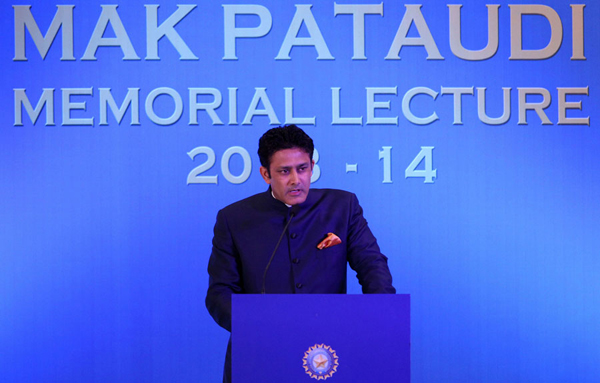Anil Kumble, the former India captain, has called on the BCCI to use its position as the dominant power in world cricket to “demonstrate leadership with responsibility” and develop a more consensual approach in its international relations. In a rare, though carefully couched, critique of the Indian board’s often overbearing tactics, he asked its administrators to “wear power lightly” and used history to illustrate how powerful empires crumble.
Kumble was delivering the MAK Pataudi Memorial Lecture – hosted by the BCCI – in Mumbai on Wednesday evening to a select gathering of guests that included the Indian and West Indies teams, BCCI president N Srinivasan and his WICB counterpart Dave Cameron along with former India captains Nari Contractor, Bishan Bedi, Sunil Gavaskar, Dilip Vengsarkar and Mohammad Azharuddin.
In the 15-odd years since Jagmohan Dalmiya took over as the ICC president, India has emerged as a dominant player in board politics solely because of the income it has generated for cricket’s governing body. Recently, under Srinivasan, the feeling among other nations is that India has used its clout to enforce its line across world cricket.
Kumble’s speech acknowledged those criticisms. “Initially, it seemed to be all about making money and telling everybody who was boss. As often happens, those who were out of power tended to imitate the actions of those who were in power earlier, and that did not serve the game well.”
Things have changed, he said, and India needed to recognize and adapt to those changes. “There has been a shift in the balance of power. It is extremely important that we wear our power lightly and make contributions that are worthy of emulation, because, cricket has to be above every other consideration… It is ironic that the rest of the cricketing world has accepted India’s lead role rather more easily and with greater pragmatism than India have.
“Notwithstanding the position of pre-eminence we enjoy both on and off the field, it is extremely important for us to demonstrate leadership with responsibility,” he said. “Traditionally, our leadership style has relied less on belligerence and more on driving consensus. It is important that the development of cricket and its popularity among its member nations are protected and nurtured.”
In private, Indian administrators have expressed the opinion that since countries like England and Australia had wielded power in an autocratic fashion in the past, now it was their turn have a taste of their own medicine. However, Kumble said administrators need to keep in mind that cricket was bigger than selfish interests.
“Power can be a heady thing, but with power comes responsibility. We must prepare to adapt to the change, embrace it and respond to it in the manner that serves the game best,” Kumble said.
“History has shown that it is in their periods of overwhelming superiority that nations sow the seeds of their fall from grace. It was true of the Roman Empire; it was true of the British Empire. The analogy can be extended to cricket. As the most significant and influential cricketing country, we must guard against repeating historical mistakes.”
Kumble, currently the head of the ICC’s cricket committee, also asked the administrators to think laterally to make the three formats of the game viable and attractive. His own contribution was to propose three distinct seasons for each of Test, ODI and Twenty20 cricket – culminating in a calendar just like that in tennis.
“Three different seasons for the game to accommodate the three different formats is easily conceivable. Specific seasons for specific formats will facilitate better planning for a longer term cricket calendar, provide clarity for spectators and allow players to prepare for the different physical and mental demands of each format.
“A good analogy would be the tennis season which moves in a logical manner from surface to surface: hard-court, clay, grass, indoors.”
Kumble, who retired in 2008, currently enjoys a reputation as a mentor – a role he has been formally entrusted with by Mumbai Indians – and he dwelt at length on the gaps in player development in India. “Cricketers are trained only to provide expression to their talent. Suddenly thrust into the limelight, they find themselves lacking in the skills to handle fame and fortune. We need both education and mentoring here.”
Pointing out how corporate houses train new recruits especially for overseas assignments, he said every aspiring cricketer should be given the training to meet the demands that go with being a professional. “Cricketers today have a lifestyle, but do they have a life?”
Kumble also spoke about the “insecurities and handicaps” players are faced with, a part of the Indian cricket story that rarely finds mention. “In recent years, many top international players have gone through phases of depression. Often the problem is either detected late or simply hidden away in embarrassment. The few players who have spoken about their own problems have provided a glimpse into a world few of us understand and even fewer acknowledge exists. Yet there are responses to stress that could be addressed through proper counseling.
“Victims of poor selection, improper injury management, even a poor run of scores need to have the opportunity to speak to those trained in handling such issues, which get blown up since top sportsmen tend to live in a fish-bowl atmosphere.”

